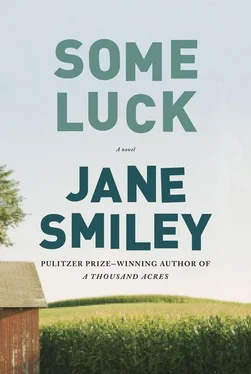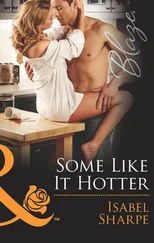“Who’s going to get that room?”
“I can’t make any promises.”
“Joey kicks all night, and he talks in his sleep, too.”
“Maybe you need Ragnar and Irma’s bed. That would solve the kicking problem.”
“Not the talking problem.”
“We’ll see. But your mama needs someone to help. She’s always had either Irma or Eloise.”
“Who would come?”
“Maybe Cousin Berta.”
“Who’s that?”
“Berta Augsberger, she was. Berta Haas. She’s a cousin in Nebraska. Second cousin. Her husband died.”
“What of?”
“Tick fever.”
“Was he a farmer?”
“Well, they lost the farm, but yes.”
“If Cousin Berta helps Mama, who helps you?”
Walter stopped and put his hand on Frankie’s shoulder. Then he said, “You do, Frankie.”
In spite of himself, Walter pronounced this as if it were bad news. He spoke as if he expected Frankie to scowl and rebel, and maybe he did — not because Frankie seemed to dislike farming or the farm, but because Frankie was rebellious. Frankie looked up at him, then looked around, out past the barn to the fields. All Frankie said was “May I have some new boots?”
Walter laughed and said, “I’ll order you some.”
AFTER THEY PLANTED the oats, Frank helped Papa spade up Mama’s garden, and then he helped plant some good things in it: peas, cabbage, onions, potatoes, carrots; later, tomatoes, radishes, beans, and corn. Frank knew that Papa thought he should mind about all this work, but he didn’t. Everybody, including Frank, was well aware that he couldn’t sit still no matter how many times he was told to settle down, so being given stuff to fiddle with was better than looking for trouble on his own. You want to get into the hayloft — well, get up there twice a day, or more, and throw down the hay. You want to mess with the horses? Well, learn how to help harness Jake and Elsa and drive them in a straight line across the field. You like to dig holes? Well, dig them the proper depth and put something in them, like seed. You like to shoot? Well, shoot a rabbit, and Mama will make rabbit stew, or shoot that coyote that’s trying to get into the chicken house. You don’t have anything to do before school, so you are sitting in your chair at the table, kicking the rungs? Get up an hour earlier and help milk the cows. You want fried chicken for supper? Go out and catch a chicken and wring its neck — you’ll have to learn sometime.
It wasn’t easy, but Papa turned out to be not as remote and gruff as Frank had feared he would be. Now, when he was showing Frank the way to do things, he was patient, and good at explaining how things worked. He showed Frank how he hung up the harness for Jake and Elsa, and that if you hung it up properly, when you took it down the next time, it went over their heads and around their bodies without tangling, and all you had to do was buckle the straps. He showed him how, at milking time, if you took ten minutes to put the bags Mama had made over the cows’ tails, you not only didn’t get muck flicked into the milk pail, you didn’t get muck flicked into your eyes or your mouth. If you then didn’t loiter about before carrying the milk pails in to Mama, then no one, cow or boy, kicked a pail over by mistake. If you fixed the fence as soon as you noticed the break, then no hogs ran through it while you were looking for the tools you should have put away in the first place. Frank would not have called it “fun” to work around the place as he was now expected to, but it was less fun to sit around, no matter where you were sitting, whether it was in the schoolhouse or at the table or reading the Bible in the evening. He had to do something, didn’t he? And, too, Papa liked to explain things to him about the farm that made the farm an idea and not just a place. Why did Papa plant clover in with the corn? Papa told him about cover crops, and how clover kept the weeds down. Why did Papa let the hogs in with the cows and the horses? Because the hogs rooted through the cowpies and manure piles and found undigested grains to eat. Why did Papa plant oats in one field one year, and then corn, and then hay? Because different crops took different things out of the soil and put different things into it. Frank liked the term he used—“rotation.”
ROSANNA WAS HAPPY to have him out of her hair. Now, if only the same thing could be done with Joey, but at seven, Joey was small for his age and continued to be a nervous case, though he had more or less stopped whining. Now he just stared. If Walter raised his voice or Rosanna burned herself with a hot pan and said “Ouch!” Joey looked startled. He did have chores — every farm boy had to have some — but they didn’t involve strength or speed, only gentleness or caution, like gathering eggs. He was, in fact, pretty good at taking a turn with the butter churn and kneading the bread. More than once, Rosanna said to him, “Well, Joey, at least you know where supper comes from. Some folks think it just appears on the table.”
For that brief time when Cousin Berta had come “for a visit,” Joey was good to her. If she said to pull the curtains, he pulled the curtains. If she very soon after that said to open the curtains, he opened the curtains. If she asked him to pump her water while she washed her hands with lye soap, he pumped. If, five minutes later, she asked again, he did it. If Lillian sat down beside Berta on the sofa, she could ask Joey to take her away, and Joey would come over and hold out his hand to Lillian and say, “Lily, let’s jump up and down eleven times.” Lillian loved to jump up and down and count — that was a game Joey came up with. After Cousin Berta went up to Independence to the asylum there, Joey was the only one who asked after her. So Joey had his virtues, Rosanna knew. But he was a small, unappealing boy. His features were not regular — his nose went just a bit to one side, like Walter’s, and his eyes were not level. How a boy with dark hair got such pale eyelashes, Rosanna did not know. His one attractive feature was his big smile. And it wasn’t as though all of these wrong bits were from the Langdon side. His eyes were the spit and image of her brother Gus. It was as if God had picked all the worst features of both families and given them to Joey. Such a cross to bear was hard for Rosanna to understand, except by remembering that she had known she needed saving but had not bothered to do anything about it.
Rosanna kept all of these feelings to herself, and prayed over and over to be rid of them — to see Joey as perfect, the way she saw Frankie (if not Lillian — she didn’t think she would ever see anyone the way she saw Lillian). She also recognized that, to her own mother and to Walter’s mother, Joey was fine—“a sweet boy,” “a darling,” or, according to Oma, “a diamond in the rough.”
FRANKIE WAS a little dismayed by what a gloomy Thanksgiving it was — Papa and Grandpa Wilmer and Grandpa Otto sitting around the table, shaking their heads and talking about “the Crash.” Even Uncle Rolf looked gloomier than usual, if that was possible. But when Frankie went out to the back porch to look at the pumpkin pie again (there was a mincemeat pie cooling there, too, but Frank didn’t like mincemeat), he found Eloise. She had her back to the door, and when she turned around, he saw that she was smoking a cigarette. She brought it to her lips, took it away, breathed the smoke out into the cool air, and said, “Say, Frankie.”
Frank said, “Yeah.”
“You’re tall.”
“I’m as tall as Bobby Dugan, and he’s twelve.”
“He must be Jed Dugan’s youngest brother.”
Frank shrugged.
“Is he a bully?”
Frank said, “Used to be.”
“Until—”
“Until he got kicked real hard in the side of his knee and had to go to Dr. Craddock and be on crutches for a couple of weeks.”
Читать дальше












